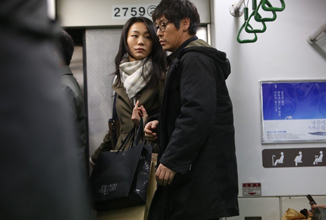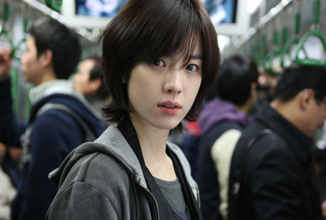"Let me tell you a fun story.
The story of a Flower Piglet who lost a screw, ate garlic and tarragon and became a Flower Deer..."
Synopsis:
Yoon-joo (Han Hyo-joo), a policewoman who possesses innate observational skills and an almost photographic memory, is tasked with following and observing a middle-aged man as part of her efforts to be accepted into a crack police surveillance team. On being discovered mid-surveillance, she learns that the man she has been pursuing is, in fact, chief Hwang (Seol Kyeong-gu), the head of the team she wishes to join but though her cover was blown and she has traits Hwang finds 'annoying', he accepts her into the unit, nonetheless, - giving her the codename ‘Piglet’- as they endeavour to stop a highly organised group of criminals led by the tacit and vicious James (Jeong Woo-seong).
However, James' observational skills and knowledge of surveillance are every bit as intricate as those of Hwang and his team and he has no intention of allowing himself to come even close to being caught, at any cost...
Review:
'Cold Eyes' is a Korean remake/reworking of 2007 Hong Kong thriller 'Eye in the Sky' and while the storyline and narrative set pieces never stray too far from the original, several small but significant 'tweaks' have been made not only to fit with current Korean blockbuster trends but also to ensure that the film feels almost inherently Korean in nature, in spite of its lineage coming from a completely separate Asian territory.
This review is certainly not written for the purpose of simply comparing and contrasting 'Cold Eyes' and 'Eye in the Sky' - the focus of the Hangul Celluloid site has always been, and will always be, on Korean Cinema exclusively, after all - but nonetheless I feel a certain amount of cross referencing is justified not only by the desire to give as balanced and informed dissection as possible but also to underline specific differences that both firmly centre 'Cold Eyes' as Korean cinema through and through and also allow the film to easily succeed to an equal - perhaps even greater - degree than the Hong Kong original.
The most strikingly obvious difference is in terms of sheer scale. 'Cold Eyes' feels like a no-expense-spared, high octane production from start to finish; special effects are more (literally) explosive than in 'Eye in the Sky'; high speed car chases and crashes are given visually stunning pride of place; the Seoul cityscape is made to positively glimmer (especially from the air) against the rundown, shadow-filled alleys of the criminal underworld; and being a far more recent film than its predecessor, the copious state of the art technology used by both the surveillance team and criminals is greatly increased. Pacing, for the large part, is also ramped up - from the main investigation itself; to the speed with which observational lists are delivered in dialogue; to the ultimate confrontations between the forces of good and the elements of evil - all of which combines deftly to allow 'Cold Eyes' to stand as the latest in a long line of pulse-pounding Korean blockbusters serving out-and-out entertainment, first and foremost. That fact in itself (to my mind, at least) also speaks of one of the main reasons this film in particular was likely chosen for a Korean remake; aside from box office, aside from heritage:
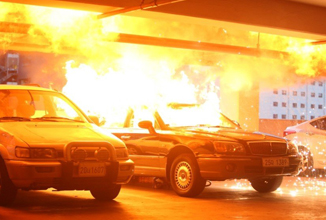 |
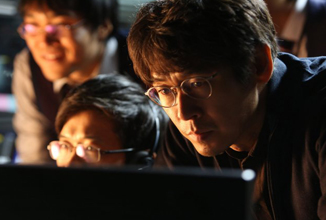 |
Step as far back into the history of Korean Cinema as you could possibly care to and you'll find a seemingly endless line of films not only centred around insightful narratives but also, above all, focused on underlying themes, critique and commentary; be it societal discussions, historical dissections, references to cultural shifts or warnings of the impending death of traditionalism in the face of globalisation and modernity. While these elements had a huge part to play in the drawing of an ever-growing audience to Korean film, in recent years there has been an increasing shift in high budget, studio created movies to narratives driven by on the surface thrills alone - entertainment for entertainment's sake - and with each box office success achieved by this approach (take as an almost perfect example 'The Thieves' - a film for which director Choi Dong-hoon readily admits deliberately avoiding including any thematic content whatsoever), its 'wisdom' is deemed suitably justified thereby serving to ensure a continuation of the trend; almost a self-fulfilling prophecy, if you will.
On top of the fact that a largely generic story such as this - good vs. evil/cops vs. robbers/law makers vs. law breakers - is also fairly universal, the lack of thematic content present in the original means the narrative was always going to be eminently transferable, with one metropolis simply replaced by another. Whether you feel that's a good or bad thing, or are largely indifferent on the subject, comes down at the end of the day to one simple question: Are you looking for a film that challenges the mind or one that simply blows it away with easy to watch engagement and/or excitement?
Personally speaking, though I ever so slightly bemoaned the outward lack of thematic and character depth, I was nonetheless engaged throughout 'Cold Eyes' and ultimately thoroughly entertained by it.
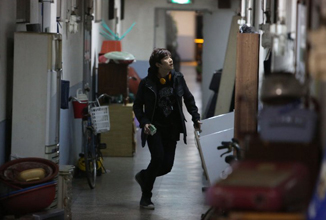 |
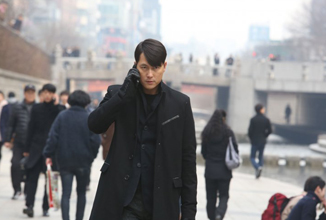 |
I have already talked a fair amount (as I'm sure you will attest) regarding the generic simplicity of 'Eye in the Sky' allowing 'Cold Eyes' to stand alongside recent thematically-light Korean 'spectacle' blockbusters, but while I fully stand by those statements they aren't the complete picture in its entirety. For while it's true that the narrative's cultural ambiguity serves to easily allow the transferring of story from Hong Kong to Korea, that fact also facilitates the addition of elements which, while not necessarily specifically Korean in nature, give a ever so slight twist to proceedings to allow the film to feel like a wholly Korean work, and in spite of the fact that I would continue to hesitate in describing them as full-blown thematic dissections or social commentaries they do give a inkling of such, to a degree:
'Cold Eyes' takes the relationships of the surveillance team and largely moves it from simple colleague-ship to full-blown camaraderie. While this move was likely just in an effort to add some (to my mind, much needed) warmth to the ongoing character interactions, the overall outcome speaks hugely of family - chief Hwang, the father; Yoon-joo, the daughter; and agent 'Squirrel', the sometimes annoying brother etc. - bringing with it all the inherent humour associated with familial bonds. Again, as far back in Korean cinema as you care to look, the importance of family has been the repeated focus of a plethora of narratives within numerous genres and, as such, its addition sits comfortably in 'Cold Eyes' underlying the overall appearance of the film as wholly Korean and fulfilling archetypal Korean aesthetics, regardless of the story's true lineage.
Not only that, but the added closeness of the characters ultimately adds an extra level of poignancy to the melodramatic part of the film's climax; once again serving a classic Korean cinematic ideal.
You could, if you choose, temper the above by saying such an assertion is just an inadvertent bonus (or even wishful thinking, on my part) of the specific elements added and/or altered by directors Cho Ui-seok and Kim Byung-seo, and again I wouldn't necessarily disagree, but either way 'Cold Eyes' benefits whether you deem those references happenstance or not.
As a final point on 'Korean-ness', if you will, the character of lead criminal James ('Shadow') is made far more vicious (fitting perfectly with the proclivity of violence in classic Korean cinema) than the comparable character in 'Eye in the Sky'; there is a far greater focus on his tacit nature adding to the feeling that his aggression is ever-bubbling just below the surface; and, though again there is little true character depth, we are at least given an overarching reason for his actions; an answer to the question of his motivation.
Summary:
A remake/reworking of 2007 Hong Kong thriller 'Eye in the Sky', 'Cold Eyes' steps up scale, pace and warmth to stand on its own as a wholly engaging and thoroughly entertaining blockbuster that even largely manages to feel specifically Korean in nature, in spite of never straying too far from the original.
Cast:
Seol Kyeong-gu, Jeong Woo-seong, Han Hyo-joo, Jin Kyeong
Directed by:
Cho Ui-seok and Kim Byung-seo
|


